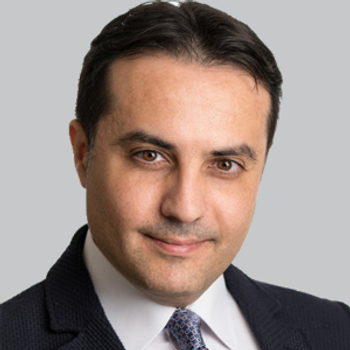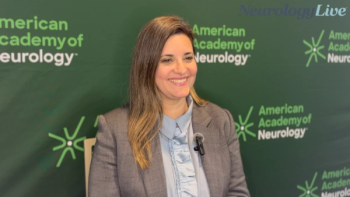
The chief executive officer and founder at CureDuchenne shared her emotional journey from her son’s diagnosis of Duchenne to embracing a new path focused on advocacy, adaptation, and resilience. [WATCH TIME: 4 minutes]

The chief executive officer and founder at CureDuchenne shared her emotional journey from her son’s diagnosis of Duchenne to embracing a new path focused on advocacy, adaptation, and resilience. [WATCH TIME: 4 minutes]

Phase 1b data show oral microbiome therapy MaaT033 slows ALS progression and is well tolerated, supporting future phase 2 development efforts.

Experts discussed how aging impacts multiple sclerosis management, treatment decisions, and overall patient health. [WATCH TIME: 5 minutes]

A recent interim analysis of a 5-year observational study showed sustained benefit of pitolisant in reducing excessive daytime sleepiness and cataplexy in patients with narcolepsy.

This closing episode looks ahead to the future of SMA care, examining how updated best practices aim to accelerate access, optimize outcomes, and fuel ongoing progress.

MeiraGTx's AAV-GAD gene therapy receives FDA RMAT designation, promising innovative treatment for Parkinson's disease through targeted brain infusion.

Experts discussed the current and future applications of AI and machine learning in multiple sclerosis research and clinical care, highlighting both opportunities and limitations. [WATCH TIME: 9 minutes]

A review highlighted the role of serum neurofilament light chain as a potential biomarker in MOG antibody-associated disease, with findings pointing to associations with attack severity.

Experts discussed the promise and uncertainty surrounding BTK inhibitors and CAR T-cell therapy in addressing progressive multiple sclerosis. [WATCH TIME: 8 minutes]

Here's some of what is coming soon to NeurologyLive® this week.

A recently published population-based study reported that patients with MS or NMOSD had a significantly higher risk of autoimmune rheumatic diseases than matched controls.

This episode tackles how proactive, interdisciplinary care and dedicated coordination models are transforming the delivery of SMA treatment across clinical settings.

Test your neurology knowledge with NeurologyLive®'s weekly quiz series, featuring questions on a variety of clinical and historical neurology topics. This week's topic is on B-cell depleting medications for MS.

The phase 2 MAGNIFY trial demonstrated that zervimesine (CT1812) slowed lesion growth in patients with geographic atrophy secondary to dry AMD, showing a 28.6% reduction over 18 months.

Panelists comment on how treatment decisions for adolescents and adults with SMA are shaped by lifestyle, quality of life, logistical realities, and access to care.

Neurology News Network. for the week ending May 10, 2025. [WATCH TIME: 4 minutes]

A duo of experts from Feinberg School of Medicine discussed the growing role of clinical algorithms, risk stratification, and treatment considerations in managing paraneoplastic neurologic syndromes alongside cancer therapies. [WATCH TIME: 4 minutes]

Take 5 minutes to catch up on NeurologyLive®'s highlights from the week ending May 9, 2025.

Catch up on any of the neurology news headlines you may have missed over the course of April 2025, compiled all into one place by the NeurologyLive® team.

The clinical associate professor of neurology and neurosurgery at NYU Langone talked about the promise of machine learning in identifying patients at high risk for hematoma expansion to guide care. [WATCH TIME: 2 minutes]

Over long-term treatment, fenfluramine significantly reduced seizure frequency, increased seizure-free days, and improved quality of life in patients with Dravet syndrome.

The professor of neurology at the University of Pennsylvania Perelman School of Medicine discussed the evolving role of noninvasive neuromodulation in promoting brain plasticity. [WATCH TIME: 3 minutes]

A study involving 20 patients with ALS found that longitudinal muscle MRI detected progressive atrophy and correlated with muscle strength loss, supporting its potential as a biomarker for ALS progression and clinical trials.

This episode explores treatment considerations for patients already living with SMA, emphasizing individualized goals, medical complexity, and the value of subtle clinical improvements.

Evan L. Smith, PhD, assistant professor of Physical Medicine & Rehabilitation at University of Michigan, discussed how emotional wellbeing, motivation, and evidence-based therapies can significantly influence outcomes in MS.

The clinical professor of stroke neurology and neurocritical care at Stanford University discussed the shifting perspective on early blood pressure lowering in intracerebral hemorrhage. [WATCH TIME: 4 minutes]

Leveraging the Enroll-HD dataset, recent data revealed consistent links between antidopaminergic medication use and worsened cognitive and motor outcomes in Huntington disease.

Early findings from the ASPIRO trial showed ANPD001 was safe, well-tolerated, and led to marked improvements in motor symptoms and daily functioning.

STN-FUS provided more sustained tremor reduction, improved bradykinesia, and had a higher responder rate at 12 months, though both treatments showed comparable reductions in rigidity and motor scores.

In this episode, neurologists unpack the urgent and complex treatment decisions in newly diagnosed SMA, highlighting clinical factors, family input, and the importance of shared decision-making.